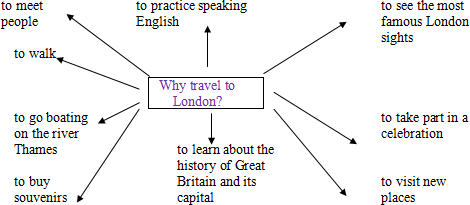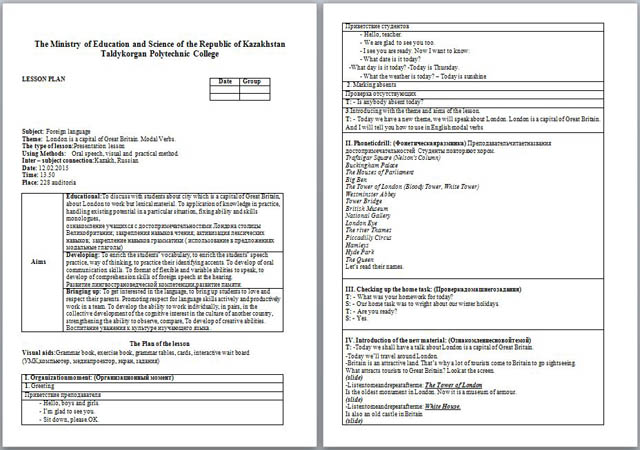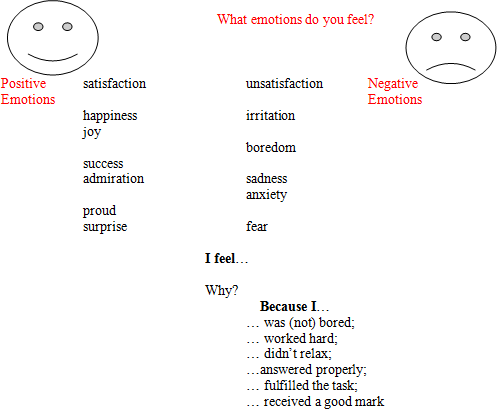|
IV. Introduction of the new material: (Ознакомлениесновойтемой) Т: -Today we shall have a talk about London is a capital of Great Britain. -Today we’ll travel around London. -Britain is an attractive land. That’s why a lot of tourists come to Britain to go sightseeing.
What attracts tourists to Great Britain? Look at the screen. (slide) -Listentomeandrepeatafterme: The Tower of London Is the oldest monument in London. Now it is a museum of armour. (slide) -Listentomeandrepeatafterme: White House. Is also an old castle in Britain (slide) -Listentomeandrepeatafterme: Westminster Abbey. Is a symbol of England. It was built in 1065. The coronation of all British Kings and Qeens takes place here. (slide) -Listen to me and repeat after me:Big Ben. Is the biggest clock bell in Britain
(slide) -Listen to me and repeat after me:Tower Bridge. Was built in 1894. It is one of the famous bridges across the Thames
(slide) -Listentomeandrepeatafterme: WindsorCastle.
-Виндзорскийзамок-однаизофициальныхзагородныхрезиденцийанглийскихмонархов,
расположенная в городе Виндзор на реке Темзе. Строительство замка было начато при Вильгельме Завоевателе. В 1992 году замок сильно пострадал от пожара, но в 1998 году был вновь открыт для посетителей. (slide) -Listentomeandrepeatafterme: BuckinghamPalace.
-Букингемскийдворец-официальнаярезиденциябританскойкоролевскойсемьивЛондоне. Дворец был построен в 1703 году герцогом Букингемским и позже приобретен королевской семьей. Во дворе перед дворцом ежедневно происходит церемония смены караула королевских гвардейцев.
(slide) -Listentomeandrepeatafterme: St. Paul’sCathedral.
-СоборсвятогоПавла-главныйсоборЛондона, былпостроенв 17 векеархитекторомКристоферомРеном.
(slide) -Listentomeandrepeatafterme: theNationalTheatre.
-Национальный театр (или Королевский Национальный театр)- современное здание в центре Лондона, включающее в себя три театра. Там расположена основная сцена Королевской Национальной театральной труппы.
(slide) -Listentomeandrepeatafterme: theTateGallery.
-Галерея Тейт- художественная галерея в Лондоне, в которой представлена коллекция живописи английских мастеров и зарубежных художников. Основана в 1897 году.
(slide) -Listentomeandrepeatafterme: theVictoriaandAlbertMuseum.
-Музей Виктории и Альберта- находится в центре Лондона, в нем представлена богатая коллекция предметов изящных и прикладных искусств разнообразных стилей и исторических периодов со всего мира, таких, как картины, ювелирные украшения, одежда и др.
(slide) -Listentomeandrepeatafterme: HydePark.
-Гайд- парк- самый известный лондонский парк; место политических митингов и демонстраций; в нем находится несколько достопримечательностей: озеро Серпантин, уголок оратора. Открытдляпубликис 1635 года.
Reading(чтение) Teacher: Listen to the text, be ready to answer the questions: London is the capital of Great Britain. It is two thousand years old. London is situated on the river Thames. There are 17 bridges across the river. The population of London is about 9 million people.
There are 3 parts in London: the City of London, the West End, and the East End.
So, London is a great city. Letter (Письмо) Teacher: And now open your copy-books, wright down the date and theme: London is a capital of Great Britain. Modal Verbs. -Writ down this text about London.
Listening (Аудирование) Teacher: Listen to the text once again, be ready to answer the questions: London is the capital of Great Britain. It is two thousand years old. London is situated on the river Thames. There are 17 bridges across the river. The population of London is about 9 million people.
There are 3 parts in London: the City of London, the West End, and the East End.It is very large and old. London is one hundred years old. So, London is a great city. Speaking (Говорение) What is the capital of Great Britain? How many bridges are there across the river? What is the population in London? How many parts are there in London? What are they? London is one of the largest cities in the world, isn’t it? Teacher: And tell me please boys and girls Why we travel to London? Write down in your copy books and then come to me and write on the desk. Студенты читают появляющуюся на экране «WordWeb»:

Teacher: That’s wrightstudents. And now we come to the second part of our lesson. We say how to use modal verbs Can, May, Must. 1. Модальнымиглаголамиявляютсяглаголыcan, may, must, ought (to), need, should. Модальные глаголы обозначают не действие, а способность, допустимость, возможность, вероятность, необходимость совершения действия. В сравнении со смысловыми глаголами модальные глаголы имеют ряд особенностей: a. Модальные глаголы не употребляются без смыслового глагола. Смысловой глагол после модальных глаголов стоит в инфинитиве без частицы to. CAN Модальный глагол can предполагает наличие возможности, позволяющей сделать что-то. В прошедшем времени имеет форму could. После can/could глагол стоит без частицы to. I can swim. Я умею плавать. I could translate this text. Я мог перевести этот текст. Данный модальный глагол имеет значение разрешения. You can leave the room. Можете выйти. Глагол can в значении «мочь» может заменяться эквивалентным по значению выражением to be able«мочь», «быть в состоянии». I shall be able to help you when I am free. Я смогу тебе помочь, когда освобожусь. MAY Модальный глагол may имеет значение иметь возможность, получить разрешение. На русский язык обычно переводится как «можете, можно». В прошедшем времени имеет форму might. После may/might глаголстоит без частицы to. You may come in. Можете войти. Еще одно значение глагола may – вероятность, предположение (может быть). It may rain today. Возможно сегодня пойдет дождь. Эквивалентом глагола may в значении «разрешать» является оборот to be allowed: Не says that he will be allowed to keep the book for seven days. MUST Модальный глагол must передает необходимость совершения действия и имеет значение «должен, обязан». Всегда употребляется в настоящем времени. После него стоит глагол без частицы to. I must be there on time. Я должен быть там вовремя. You must do what I tell you. Вы должны делать то, что я вам говорю. Синонимом является глагол to have to, который имеет значение «приходиться». Может употребляться в любом времени. Вопросительная и отрицательная формы образуются с помощью вспомогательного глаголаdo/does. I have to go. Я должен (вынужден) идти. When do you have to go? Когда ты должен идти? I don’t have to read it again. Мне не надо читать это снова.
| 

 Получите свидетельство
Получите свидетельство Вход
Вход














 Урок английского языка на тему "London is a capital of Great Britain. Modal Verbs" (52.08 КB)
Урок английского языка на тему "London is a capital of Great Britain. Modal Verbs" (52.08 КB)
 0
0 986
986 116
116 Нравится
0
Нравится
0


